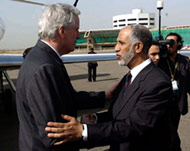France urged to admit 1945 massacre
President Abdelaziz Bouteflika has called on France to admit its part in the massacres of 45,000 Algerians who took to the streets to demand independence as Europe celebrated victory over Nazi Germany on 8 May 1945.

Algeria is marking the 60th anniversary of the repression of pro-independence demonstrators under French colonial rule as Europeans celebrate the end of the second world war in Europe.
“The paradox of the massacres of 8 May 1945, is that when the heroic Algerian combatants returned from the fronts in Europe, Africa and elsewhere where they defended France’s honour and interests … the French administration fired on peaceful demonstrators,” Bouteflika said in a speech published by state media on Sunday.
Colonial forces launched an air and ground offensive against several eastern cities, particularly Setif and Guelma, in response to anti-French riots, which killed about 100 Europeans.
Brutal crackdown
The crackdown lasted several days and according to the Algerian state left 45,000 people dead. European historians put the figure at between 15,000 and 20,000.
|
“The French administration fired on peaceful demonstrators” President Bouteflika in a speech commemerating the 6oth anniversary of World War Two |
It marks one of the darkest chapters in the history of Algeria and France, which ruled the North African country brutally from 1830 until 1962.
France’s ambassador to Algeria said in February that the Setif massacre was an “inexcusable tragedy”. It was the most explicit comments by the French state on the event.
“The Algerian people are still waiting for … the declarations of the ambassador of France to be followed by a more convincing gesture,” Bouteflika said in the speech given in Setif on Saturday.
Remembrance events
Several remembrance events were held across Algeria, with more than 20,000 people, including ministers, taking part in a march on the same route protesters took in Setif in 1945.
The repression sparked the anti-colonial movement and a long war of independence, costing the lives of 1.5 million Algerians, according to the government. Many French also perished.
“The Algerian people have always been waiting for France to admit the acts perpetrated during the colonisation period and the liberation war to pave the way for broader and new friendship and cooperation prospects,” Bouteflika said.
Algeria also called on Sunday for international help in removing millions of landmines France planted along its borders with Morocco and Tunisia during its war of independence.
Removing anti-personnel mines
“We cannot detect anti-personnel mines with the technical means at our disposal,” Junior Interior Minister Dahou Ould Kablia told an international anti-personnel mines conference in Algiers.
Algeria says it has got rid of 8 million French mines but still has another 3 million to clear.
French Foreign Minister Michel Barnier said in an interview published on Sunday in Algerian daily El Watan that both countries needed to “look together at the past, in order to overcome the chapter most painful for our two peoples”.
Algeria and France are gradually normalising ties and are due to sign an important friendship treaty this year, similar to the 1963 Franco-German reconciliation treaty.
Postwar power
 |
|
Later this year, France and Algeria |
After seeing its diplomatic and economic influence over Algeria weakened in recent years as the United States developed more oil interests and power in the region, France is trying to regain the upper hand.
“I don’t think (the French comment) is enough to satisfy the Algerian public … but it’s a step forward as never before has there been such a move from the French,” said Benjamin Stora, considered France’s leading historian on Algeria.
Many Algerian political figures and historians, who call the massacre a genocide, not only want an apology but demand compensation.
“Sixty years later, France does not recognise its crimes against humanity,” Algerian French-language newspaper La Tribune said on its front page.